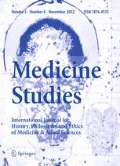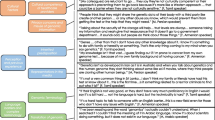Abstract
Is genetic information different from other types of medical information and is therefore a special treatment required because of its special features? This question has been discussed since the mid-1990s under the label of genetic exceptionalism. This article discusses the essential arguments of the genetic exceptionalism discourse and analyzes their ethical reach. The primary question of this paper is whether the arguments of the current debate, with its predominantly scientific focus, are capable of solving the ethical questions raised by genetic exceptionalism in such a way as to do justice to the normative scope and epistemological complexity. The author argues that the current genetic exceptionalism discourse is restrictive and offers little opportunity for exploring viable and ethically justifiable solutions regarding the implementation of genetic information in medical practice. Discourses on genetic exceptionalism should not only adhere to scientifically consistent criteria but also reflect individual perceptions and cultural values, enriched by adequate historical reflection.
Similar content being viewed by others
Notes
A quick search for such books at amazon.com yielded over 500 titles on the prevention of cancer in the section on “books” alone.
The “hype” over the drug Tamoxifen is a vivid example of the loss of women’s autonomy caused by a discourse on embodied genetic risk; cf. Poe 1999.
There might be a genetic contribution to the controllability of external risks, however, like resistance to HIV infections found in CCR5-delta32-Allel-carriers, but this does not change the fact that genetic risk is different from health risks that can be addressed by behavioral or environmental prevention on a categorical level.
References
Andrews, L.B. 1997. Gen-Etiquette: Genetic information, family relationships, and adoption. Genetic secrets. In Protecting privacy and confidentiality in the genetic era, ed. M.A. Rothstein, 255–280. New Haven/London: Yale University Press.
Angastiniotis, M. 1992. Management of thalassemia in Cyprus. Birth Defects 28(3): 38–43.
Annas, G.J. 1993. Privacy rules for DNA databanks. Protecting coded ‘future diaries’. Journal of the American Medical Association 270(19): 2346–2350.
Annas, G.J., L.H. Glantz, et al. 1995. Drafting the genetic privacy act: Science, policy, and practical considerations. Journal of Law, Medicine & Ethics 23(4): 360–366.
Bates, B.R., A. Templeton, et al. 2003. What does “a gene for heart disease” mean? A focus group study of public understandings of genetic risk factors. American Journal of Medical Genetics. Part A 119A(2): 156–161.
Bayer, R. 1991. Public health policy and the AIDS epidemic. An end to HIV exceptionalism? The New England Journal of Medicine 324(21): 1500–1504.
Beskow, L.M., W. Burke, et al. 2001. Informed consent for population-based research involving genetics. Journal of the American Medical Association 286(18): 2315–2321.
Bhardwaj, M. 2006. Looking back, looking beyond: Revisiting the ethics of genome generation. Journal of Biosciences 31(1): 167–176.
Bondy, M., and C. Mastromarino. 1997. Ethical issues of genetic testing and their implications in epidemiologic studies. Annals of Epidemiology 7(5): 363–366.
Broadstock, M., S. Michie, et al. 2000. Psychological consequences of predictive genetic testing: A systematic review. European Journal of Human Genetics 8(10): 731–738.
Bundesärztekammer. 2003. Richtlinien zur prädiktiven genetischen Diagnostik. Bekanntmachungen. Deutsches Ärzteblatt 100(19): A 1297–A 1305.
Burris, S. 1994. Public health, “AIDS exceptionalism” and the law. John Marshall Law Review 27(2): 251–272.
Catz, D.S., N.S. Green, et al. 2005. Attitudes about genetics in underserved, culturally diverse populations. Community Genetics 8(3): 161–172.
Ciba, F. 1990. Human genetic information: Science, law and ethics. Chichester: Wiley.
Clarke, A., and E. Parsons (eds.). 1997. Culture, kinship and genes. Towards cross-cultural genetics. Basinktoke: Palgrave Macmillan.
Condit, C.M., R.L. Parrott, et al. 2000. Principles and practices of communication processes for genetics in public health. In Genetics and the public health in the 21st century, ed. M.J. Khoury, et al., 549–567. Oxford/New York: Oxford University Press.
De Cock, K.M., and A.M. Johnson. 1998. From exceptionalism to normalisation: A reappraisal of attitudes and practice around HIV testing. British Medical Journal 316(7127): 290–293.
Evans, J.P., and W. Burke. 2008. Genetic exceptionalism. Too much of a good thing? Genetics in Medicine 10(7): 500–501.
Everett, M. 2004. Can you keep a (genetic) secret? The genetic privacy movement. Journal of Genetic Counseling 13(4): 273–291.
Fink, S. 2003. EEOC v. BNSF: The risks and rewards of genetic exceptionalism. Washburn Law Journal 42(3): 525–534.
Finkler, K. 2001. The kin in the gene. The medicalization of family and kinship in American Society. Current Anthropology 42(2): 235–263.
Finkler, K. 2005. Family, kinship, memory and temporality in the age of the new genetics. Social Science and Medicine 61(5): 1059–1071.
Finkler, K., C. Skrzynia, et al. 2003. The new genetics and its consequences for family, kinship, medicine and medical genetics. Social Science and Medicine 57(3): 403–412.
Gostin, L.O., and J.G. Hodge. 1999. Genetic privacy and the law: An end to genetics exceptionalism. Jurimetrics 40: 21–58.
Green, R.M. 2006. From genome to brainome: Charting the lessons learned. In Neuroethics: Defining the issues in theory, practice, and policy, ed. J. Illes, 105–121. New York: Oxford University Press.
Green, M.J., and J.R. Botkin. 2003. “Genetic exceptionalism” in medicine: clarifying the differences between genetic and nongenetic tests. Annals of Internal Medicine 138(7): 571–575.
Hellman, D. 2003. What makes genetic discrimination exceptional? American Journal of Law and Medicine 29(1): 77–116.
Hoedemaekers, R., and H. ten Have. 1998. Geneticization: The Cyprus paradigm. Journal of Medicine and Philosophy 23(3): 274–287.
Hubbard, R. 1993. Predictive genetics and the construction of the healthy ill. Suffolk University Law Review 27(4): 1209–1224.
Ilkilic, I., and N.W. Paul. 2009. Ethical aspects of genome diversity research: Genome research into cultural diversity or cultural diversity in genome research? Medicine, Health Care and Philosophy 12(1): 25–34.
Ilkilic, I., M. Wolf, and N.W. Paul. 2007. Schöne neue Welt der Prävention? Zu Voraussetzungen und Reichweite von Public Health Genetics. Das Gesundheitswesen 69(2): 53–62.
Kay, L.E. 2000. Who wrote the book of life? A history of the genetic code. Stanford: Stanford University Press.
Lapham, E.V., C. Kozma, et al. 1996. Genetic discrimination: Perspectives of consumers. Science 274(5287): 621–624.
Launis, V. 2003. Solidarity, genetic discrimination, and insurance: A defense of weak genetic exceptionalism. Social Theory Practice 29(1): 87–111.
Lazzarini, Z. 2001. What lessons can we learn from the exceptionalism debate (finally)? Journal of Law, Medicine and Ethics 29(2): 149–151.
Lippman, A. 1991. Prenatal genetic testing and screening: Constructing needs and reinforcing inequities. American Journal of Law and Medicine 17(1–2): 15–50.
Manson, N. 2006. What is genetic information, and why is it significant? A contextual, contrastive, approach. Journal of Applied Philosophy 23(1): 1–16.
McGee, G. 1998. Genetic exceptionalism. Harvard Journal of Law and Technology 11(3): 565–570.
McGuire, A.L., R. Fisher, et al. 2008. Confidentiality, privacy, and security of genetic and genomic test information in electronic health records: Points to consider. Genetics in Medicine 10(7): 495–499.
Murray, T.H. 1997. Genetic exceptionalism and “future diaries”: Is genetic information different from other medical information? In Genetic secrets. Protecting privacy and confidentiality in the genetic era, ed. M.A. Rothstein, 60–73. New Haven: Yale University Press.
Offit, K., E. Groeger, et al. 2004. The “duty to warn” a patient’s family members about hereditary disease risks. Journal of the American Medical Association 292(12): 1469–1473.
Paul, N.W. 2002. Genes-information-volatile bodies. Health and quality of life. In Philosophical, medical, and cultural aspects, ed. A. Gimmler, et al., 187–198. Münster: LIT.
Paul, N.W. 2003. Auswirkungen der Molekularen Medizin auf Gesundheit und Gesellschaft. Gutachten Bio und Gentechnologie. Berlin: Friedrich-Ebert-Stiftung.
Paul, N.W. 2004. Societal implications of a wide-spread predictive testing for hereditary tumors. Journal of Cancer Research and Clinical Oncology 130(Supp. 1): 26.
Peters, N., A. Rose, et al. 2004. The association between race and attitudes about predictive genetic testing. Cancer Epidemiology, Biomarkers and Prevention 13(3): 361–365.
Poe, A. 1999. Cancer prevention or drug promotion? Journalists mishandle the tamoxifen story. International Journal of Health Services 29(3): 657–661.
Richards, M. 2001. How distinctive is genetic information? Studies in History and Philosophy of Biological and Biomedical Sciences 32(4): 663–687.
Ross, L.F. 2001. Genetic exceptionalism vs. paradigm shift: Lessons from HIV. Journal of Law, Medicine and Ethics 29(2): 141–148.
Rothstein, M.A. 1992. Discrimination based on genetic information. Jurimetrics 33(1): 13–18.
Rothstein, L.F. 1997. Genetic information on schools. In Genetic secrets. Protecting privacy and confidentiality in the genetic era, ed. M.A. Rothstein, 317–331. New Haven: Yale University Press.
Rothstein, M.A. 2005. Genetic exceptionalism & legislative pragmatism. Hastings Center Report 35(4): 27–33.
Schüle, C. 2001. Kinder nur nach Gentest. Die Zeit 8: 1–5.
Suter, S. 2001. The allure and peril of genetic exceptionalism: Do we need special genetics legislation? Washington University Law Quarterly 79(3): 669–748.
Troy, E.S.F. 1997. The genetic privacy act: An analysis of privacy and research concerns. The Journal of Law, Medicine and Ethics 25(4): 256–272.
Wexler, A. 1996. Mapping fate. A Memoir of Family, Risk, and Genetic Research. Berkeley: University of California Press.
Acknowledgments
This study was initiated and supported by the German National Genome Research Network, NGFN2 (supported by the German Ministry of Science and Education, BMBF 01GR0467), project “Public Health Genetics”. 1. The author would like to thank Prof. Dr. Norbert W. Paul, Dr. Meike Wolf, Dr. Rainer Brömer, Prof. Dr. Robert Cook-Deegan (Duke University) and Prof. Dr. Lauren Dame (Duke University) for their important comments and critical perusal of this manuscript.
Author information
Authors and Affiliations
Corresponding author
Rights and permissions
About this article
Cite this article
Ilkilic, I. Coming to Grips with Genetic Exceptionalism: Roots and Reach of an Explanatory Model. Medicine Studies 1, 131–142 (2009). https://doi.org/10.1007/s12376-009-0015-7
Received:
Accepted:
Published:
Issue Date:
DOI: https://doi.org/10.1007/s12376-009-0015-7




